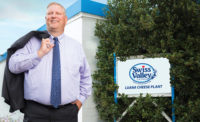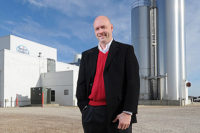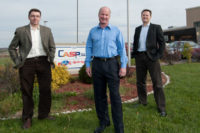Swiss Valley Farms chief executive officer Donald A. Boelens was dealing with volatile milk prices and a collapsing export market in 2008-2009. Looking back, he says he knew there had to be a better management structure, one that could allow the company to take advantage of opportunities caused by price fluctuations and at the same time deal with the hardships.
So, with the backing of the co-op’s board of directors, he set out to change the organization of the Davenport, Iowa-based dairy cooperative. In June 2011, Boelens reorganized the management structure to make the co-op more nimble and able to react quicker to opportunities in the marketplace. He changed Swiss Valley Farms from a company aligned by functions (sales, operations, marketing) to one aligned by product lines (natural cheese, dairy ingredients, procurement).
Swiss Valley Farms makes cheeses in Iowa, Minnesota and Wisconsin, but its products are sold around the world. With 2011 revenues of nearly $400 million (up from $333 million in 2010), the firm placed 51st on the most recent Dairy 100, Dairy Foods’annual list of the nation’s largest dairy processors. With 683 member farms producing 1.5 billion pounds of milk annually, it is the 21st largest dairy cooperative, according to Hoard’s Dairyman magazine.
Boelens joined the co-op’s management team in 2001 as chief financial officer and was named co-CEO with J. Gordon Toyne in 2003. When Toyne retired in 2008, Boelens became the sole CEO.
Jeff Saforek, vice president and general manager of the Dairy Ingredients and Export division, describes the company as “quick and lean.” Saforek’s division consists of cream cheese, club cheese, processed cheese and whey powders. Jeff Jirik is vice president and general manager of the Natural Cheese division, which consists of the company’s Swiss, Baby Swiss and blue cheese products. Chris Hoeger is the company’s vice president and general manager of Procurement. Each has profit-and-loss responsibilities. It keeps them focused on running a tight ship.
It was hard to coordinate activities in the former alignment, Boelens says. Now, he calls Swiss Valley Farms “flexible and adept” and able to react to requests in weeks, not months. For example, a customer wanted a reduced-fat product, and Swiss Valley Farms created it in nine weeks. It could have taken nine months in the previous alignment, he says.
While the economy was affecting all dairy processors, not just cheesemakers, there were also changes in the structure of dairy farming, which directly affect cooperatives. Large farming operations have more options as to whom they affiliate with, says agricultural economist Bob Cropp, a professor emeritus at the University of Wisconsin, who has been following dairy cooperatives for 40 years.
One way to retain membership is to increase the value to the producer by providing them a secure market for their milk along with a solid pay price and dividend. Companies have to find or create an advantage to compete successfully. Swiss Valley Farms has a history of adding value to its milk. Cropp says Swiss Valley Farms was an early advocate of adding value to dairy products. The co-op leadership has always insisted on high-quality milk, and it was a proponent of analyzing milk for its butterfat, proteins and other solids, Cropp says. Swiss Valley Farms’ strategy is to make high-quality cheeses, which offer high returns to co-op members.











